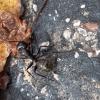Hello, haven't posted here in a long time.
Weird title, but it exactly describes a problem I have. A founding aphaenogaster colony (3 workers) recently came out of hibernation. The queen laid a new and decently large pile of eggs, and then curled up and died. Is it possible she died due to exhaustion? Like some sort of problem with their conditions? Or maybe I didn't feed them enough sugars/carbs? Ants are really good at laying eggs, seems weird a queen would die during childbirth.
Any suggestions would be deeply appreciated.




















